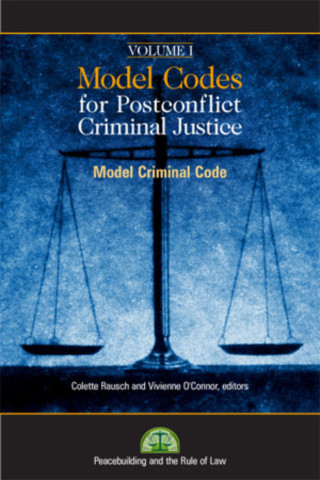Model Codes for Post-Conflict Criminal Justice
Of unparalleled breadth, depth, and authority, the Model Codes for Post-Conflict Criminal Justice is a criminal law reform tool tailored to the needs of countries emerging from conflict. Its three volumes present four complete legal codes that national and international actors can use to create, overhaul, update, or plug gaps in the criminal laws in individual post-conflict states. Each volume offers not only substantive legal provisions but also expert commentary that explains wording choices, elaborates on the content of the provisions, and highlights associated considerations and reforms.
This volume, the first to be published (the second and third volumes will appear in spring 2008 and spring 2009), opens with a User’s Guide that explains the development, purpose, and content of the book, and then lays out a comprehensive Model Criminal Code. The code is divided into two parts: a “General Part” that contains general principles of criminal law and penalties, and a “Special Part” that presents a catalog of criminal offenses, including those such as sexual offenses, organized crime, and corruption that are particularly common or destabilizing in post-conflict environments.
The Model Codes for Post-Conflict Criminal Justice is the culmination of a six-year project spearheaded by the United States Institute of Peace and the Irish Centre for Human Rights, in collaboration with the UN Office of the High Commissioner for Human Rights and the UN Office on Drugs and Crime. More than two hundred experts and practitioners from across the world were involved in the drafting, vetting, and revision of the provisions and their commentaries. This enormous breadth of expertise has allowed the Model Codes to draw on lessons learned in a variety of post-conflict states and from the laws of a remarkable variety of the world’s legal systems and traditions. The result is an indispensable resource for those striving to reestablish the rule of law in societies recently wracked by violent conflict.
—Each copy of this volume contains a CD of the complete text.
User’s Guide
CONTENTS
Introduction • The Model Codes Project: A Response to Post-Conflict Criminal Law Needs • Potential Uses of the Model Codes in a Criminal Law Reform Process • A Synopsis of the Model Criminal Code • Guiding Principles for the Criminal Law Reform Process
Part I: General Part
Definitions • Fundamental Principles • Jurisdiction • Ne Bis in Idem Statutory Limitations • Time and Place of Commission of a Criminal Offense • Criminal Offense, Criminal Responsibility, and Commission of a Criminal Offense • Criminal Responsibility of Legal Persons • Justification and Excusal of Criminal Responsibility • Criminal Attempt • Participation in a Criminal Offense • Penalties • Confiscation of the Proceeds of Crime and Property • Dispositions Applicable to Juveniles and Adults on Trial for Criminal Offenses Committed as Juveniles
Part II: Special Part
Genocide, Crimes against Humanity, and War Crimes • Offenses against Life and Limb • Sexual Offenses • Offenses against the Rights of Persons • Offenses against Children • Property Offenses • Economic Offenses • Organized Crime Offenses • Corruption Offenses • Corruption-Related Offenses and Other Offenses Involving a Public Official • Offenses against the State, Public Safety, and Security • Offenses against United Nations and Associated Personnel • Offenses Involving Firearms, Ammunition, Explosives, and Weapons • Drugs Offenses • Election Offenses • Cybercrime Offenses • Offenses against the Administration of Justice • Index
Vivienne O'Connor
Vivienne O'Connor is an independent rule of law consultant with fifteen years of experience in the field. She heads TransformLaw, an interdisciplinary consulting firm that provides strategic advice on how to facilitate transformative legal change processes in conflict-affected and developing countries. From 2007 until 2016, Vivienne worked for USIP as a senior rule of law adviser and as director of the International Network to Promote the Rule of Law. She has engaged in rule of law projects in numerous countries that include Afghanistan, Burma, Haiti, Liberia, Nepal, and Syria. Vivienne has trained hundreds of rule of law practitioners through the “Rule of Law Practitioner’s Course” that she designed and delivered for USIP, the UK Department for International Development, and the Australian government. Vivienne holds a bachelor’s degree in civil law, a master’s degree in international human rights law (LLM), and a PhD in law from the National University of Ireland, Galway. She is the author of several books, including volumes 1 and 2 of Model Codes for Postconflict Criminal Justice. She is currently writing a monograph titled Transformative Rule of Law: Theory and Practice.

